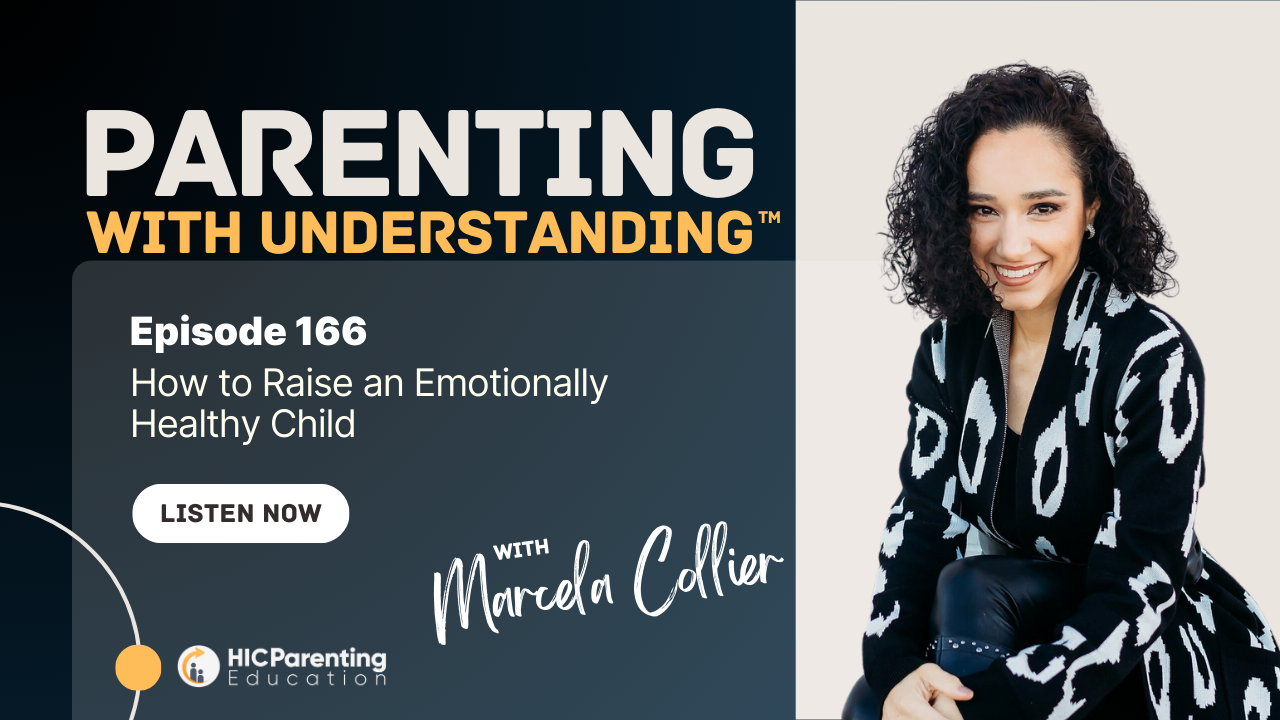Epi #166. How to Raise an Emotionally Healthy Child
May 27, 2025
If you want to raise an emotionally healthy child—but you’re not sure how because you were never taught how to be one yourself—this is for you. 💛
You’ve seen the tantrums. The hitting. The defiance. The bedtime stalling. And maybe deep down you’ve wondered:
“Can I really raise a secure, emotionally healthy child… when I wasn’t raised that way myself?”
Let me tell you something right now:
Yes, you can.
And I’m going to show you how.
- Emotional Health Starts in the Brain 🧠
Let’s start with this: Emotional health is how we process our feelings and experiences.
It means having a balanced inside life (how we feel) and outside life (how we act).
But kids can’t do that alone.
Their brains are still growing. Especially the parts that help them stay calm, think clearly, and make good choices.
Our job as parents is to help them build that brain wiring.
That’s why how we respond matters way more than whether they tantrum.
- A Big Loss Showed Me What Really Shapes Emotional Health
When my twins were six, they lost their grandma—Oma.
She lived with us. They loved her so much.
It was a huge loss for them. But here’s what mattered most:
How we helped them process it.
We didn’t say, “Don’t cry.” Or “She’s in a better place.”
We said, “It’s okay to be sad. Mommy is sad too. You can cry with me.”
We made space for their questions. Their feelings. Their grief.
That’s what helped their brains make sense of something so big.
And that’s what kept their emotional health strong.
- A Tantrum Doesn’t Mean Something’s Wrong
If your toddler loses it over a banana or your teen yells, “You never listen!”—you’re not failing.
It just means their brain isn’t fully developed yet.
And that’s okay.
What matters is this:
How do you respond?
Do you yell back? Or shut down? (No shame—we’ve all done it.)
Or do you breathe, stay close, and help them calm down?
That’s where emotional health starts.
- Your Child Needs You to Help Their Brain Grow
Children’s brains grow from the bottom up:
- Survival brain (fight, flight, freeze)
- Emotional brain (big feelings)
- Logical brain (planning, self-control)
A two-year-old doesn’t have the wiring to stay calm when frustrated.
A nine-year-old may still struggle to manage disappointment.
That doesn’t mean something’s wrong.
It means they need your help to integrate what they feel with what they think.
That’s called brain integration. And it’s our job to support it.
- Integration Happens When You Help Them Make Sense of Things
Let me explain with an example.
When Oma died, one of my sons asked: “Where did she go? Is she in heaven? What happens now?”
Instead of brushing it off, we answered. Gently. Honestly. Simply.
We helped him connect his thoughts, emotions, and what was happening.
We said, “Yes, she died. It’s okay to miss her. Mommy misses her too. You’re safe.”
That’s integration.
When a child gets that kind of support, their brain wires for emotional strength.
- What Happens When Kids Don’t Get This Support?
When I was six, I lost my uncle. No one explained anything to me.
I just saw my mom crying and people whispering.
I didn’t know what happened. I didn’t feel safe. I felt confused and scared.
After that, I started hitting other kids. I struggled in school.
That’s what happens when children aren’t given a way to understand what’s going on.
It stays stuck. Their behavior tells the story they don’t have words for.
But when we guide them through? Everything changes.
- Even Small Stressful Moments Need Integration
It’s not just about big losses. Small daily stress matters too.
A fight with a sibling. A hard math problem. Being left out by a friend.
Every stressful moment is a chance to help them integrate.
Say things like:
- “You’re frustrated. That puzzle is tricky.”
- “You felt left out today. That’s hard.”
- “You were sad when I had to leave. But I came back.”
These little moments help them build a strong emotional foundation.
- You Don’t Have to Be Perfect—Just Willing to Repair
We all lose it sometimes. I do, too.
What matters most is that we repair.
Say, “I’m sorry I yelled. I was tired. It’s not your fault. You’re not a bad kid.”
That simple repair helps your child stay emotionally healthy.
It tells their brain: “I’m still safe. I’m still loved. It wasn’t about me.”
- Even Adults Can Be Emotionally Unhealthy
Ever see a grown-up scream at someone in traffic or lose it in a store?
That’s not just a bad day. That’s a sign of a brain that never learned how to integrate.
Emotional health isn’t just about age. It’s about growth.
And if you never got that growing up, you can start now.
You can rewire your brain. And help your child wire theirs.
- Let’s Build a Healthier Brain—Together
It’s okay if you didn’t grow up with emotional health.
You can give it to your children. And you can give it to yourself, too.
It starts with one step.
🎁 Join my free class: The U.S.E Method to Correct Any Behavior with Ease
In this class, I’ll show you:
✅ How to overcome angry reactions and have calm responses during your children’s chaos
✅ How to communicate so your child listens—even when you say “no”
✅ How to raise emotionally healthy children who can face the real world with confidence and self-accountability
You’re not behind. You’re exactly where you need to be.
Let’s build secure homes—together. 💛



